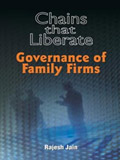Family Business
A poem by Nadir Godrej
Now family businesses aren't so rare,
In fact they spring up everywhere,
But very few are known to last,
Most disappear very fast.
Some last throughout the founder's life.
Some end in acrimonious strife.
Two generations is pretty good
And yet it should be understood
That very few can last for three.
But all of us can clearly see
That some go on for years and years
And out-compete their many peers.
And what is it that gives them strength?
I could go on, like this, at length
But it will suffice now to say
That family businesses learn to stay
Because they take the long term view
That professionals so rarely do.
But family businesses need a head
And when the leader's ill or dead
We need someone else instead.
The business has to be well led.
The family may have an heir
But he or she may not care
Or even have the needed skill
Successfully to fulfil
The tasks a leader's role demands.
And so before the business lands
Into unskilled, unwilling hands,
I'm sure you'll all agree it stands
To reason that we must all plan
That the business gets the woman or man
That's best for it to thrive and grow.
For those who study families know
Successions must take in account
Perhaps in an equal amount
The business needs, the family,
The management, not one, all three.
The business needs a strategic plan.
Rules are required for the clan
That bear in mind that they have goals
And specify what are their roles.
A succession plan is a must,
It makes no sense to suddenly thrust
An ill prepared elder son
Into the role of number one.
The heir should be planned and groomed
Or else the business will be doomed.
© All rights reserved. Originally published with permission in November 2002 issue of Roots 'n Wings.


